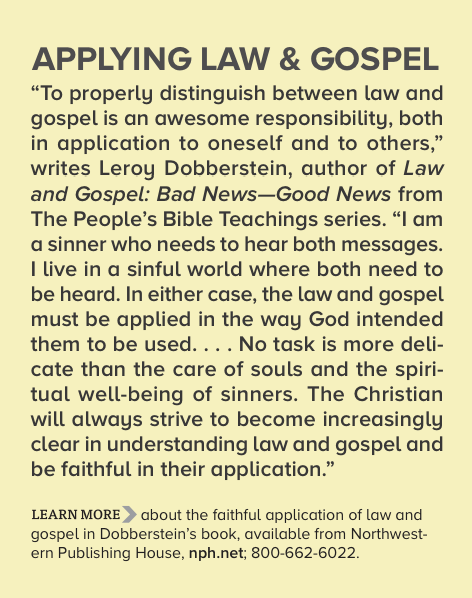 |
In my opinion, this is the toughest part of being a Christian parent—letting the gospel shine in how I deal with my kids. It just seems to come naturally to me to be law-oriented. You sin. You experience a consequence. So logical. What isn’t logical is how God deals with us as his children. It’s all about grace—his grace that I should now reflect to my children. Is this a struggle for you too? Read on to see how two Christian parents approach this challenging aspect of parenthood.
— Nicole Balza
You and your spouse sit on the plane as newlyweds with arms crossed and annoyed gazes. Three rows back, a baby fills the entire cabin with ear-piercing screams. You whisper to your spouse, “If that were our child, we would not let that happen.” The same words are uttered under your breath as the scenario plays out on a grocery store floor during the epic meltdown of a toddler.
Fast forward. The doctor shouts, “It’s a boy!” As tears flow, you hold your firstborn. Your life has forever changed. King David reminds us that under this panda bear onesie lies a sinner (Psalm 51:5). As he grows, so do his sins, as do the smiles of your parents and teachers recalling you at that age. Apparently taking a ballpoint pen and writing on the bedsheets and bedroom walls seems logical to the six-year-old as does having a meltdown in the grocery store over fruit snacks to the four-year-old. Boom! You have become those parents. Are you ready? Are you prepared?
Here’s my humble advice—not Scripture, but it has worked for our family:
- Have a plan. I know it sounds odd, but in the premarriage, lovey-dovey stages, have the tough conversation of your joint plan to discipline your children. Perhaps your spouse’s family’s and your family’s thoughts on effective discipline differ. How will the two of you handle the scenarios above?
- Communicate. If that doesn’t work, communicate even more—with each other and with your child. The child will try to pit parents against each other. My wife and I have found (after whatever discipline we’ve agreed upon from #1 above) that having the child explain back to us why he was being disciplined has helped him to see the error of his ways. Constant communication with your spouse helps the two of you work as a team. Communication with the child helps him to see his sin and more times effectively curbs that attitude.
- Let the gospel predominate. Newsflash: We are sinful. We will make mistakes, but each mistake is forgiven (that includes parenting mistakes). When disciplining, if you see repentance, be quick with the gospel to comfort the child. Proud parent moment: Sitting next to my son during one of his timeouts and hearing, “You hate me, daddy.” I said, “No, son, I do not hate you. What you did was wrong, but like God, I love you and forgive you!”
Being a father has made me more empathetic to what God must feel when I continuously do boneheaded things. God comes to us in his Word and sacrament, and what is unfathomable is that he took his Son and punished him in our place. This is love. This is what is to be evident in parenting. Discipline—yes, but Jesus took our disobedience and now stands in love at the forefront of our parenting. And yes, that includes everywhere from the airplane to the grocery store floor and beyond.
Clark Schultz
As Christian parents we know the importance of the law and the gospel. The law teaches that we need a Savior. The gospel is the good news that we have one.
We all are born with a conscience. I grew up with a healthy conscience. I often felt like I didn’t get to do “fun” things because I would feel so guilty if I did. Or I would make sure to do the right thing so I could avoid that horrible feeling of guilt. I remember hoping that my children would have the same conscience I did so that they would keep out of trouble.
I don’t wish that anymore. Don’t get me wrong. I hope they have a good sense of what is right and wrong based on God’s laws, but not for the same reasoning I had. I did the right thing in order to avoid guilt. I do not want the same for my children. Guilt motivation is full of shame and fear. I realized this in my 40s and had to take a hard look at my parenting. See, guilt motivation is effective in changing behavior. But as my kids get older, I don’t want to focus on their behavior. I want to focus on their hearts.
I did the right thing in order to avoid guilt. I do not want the same for my children.
Focusing on their hearts is difficult. It takes time and hard conversations. It isn’t just addressing the behavior; it’s looking at the root of the behavior. And in those deep, hard places, there has to be grace. I want them to be motivated by love.
 It wasn’t too long ago one of our kids came to my husband and me with regret over a sin. It hurt this momma’s heart because his behavior wasn’t what I wanted for him and, if I’m being honest, my ego wanted him to behave a certain way and he didn’t (the whole “my kid would never do that” pride).
It wasn’t too long ago one of our kids came to my husband and me with regret over a sin. It hurt this momma’s heart because his behavior wasn’t what I wanted for him and, if I’m being honest, my ego wanted him to behave a certain way and he didn’t (the whole “my kid would never do that” pride).
As he came to us, we chose grace. Our son already had enough shame and guilt over what he did. My husband and I needed to remember that the Spirit lives in him. God already convicted him through the law to recognize he needed forgiveness. He didn’t need the law from us. He needed forgiveness. He needed grace. He needed freedom.
Living in freedom is what our Creator, our Father, wants for us: to do the right thing because we get to do it and to choose to walk away from the wrong thing because Jesus has so much more for us. So, more living motivated by love and not to avoid guilt. That’s what I want for my kids. That’s what I want for me. That’s what I want for all of my brothers and sisters in Christ.
Jenni Schubring
Authors: Multiple authors
Volume 107, Number 10
Issue: October 2020
- Parent conversations: How can parents and kids manage stress?
- Parent conversations: What do your prayers for your children include?
- Parent conversations: How do we resist making our parenting law-based?
- Parent conversations: What Bible passages do you turn to most as a parent?
- Parent conversations: How can we help kids develop positive, healthy habits?
- Parent conversations: What tactics do you use to encourage children to tackle difficult tasks?
- Parent conversations: How can we model good listening skills for our kids?
- Parent conversations: How do we help our kids move on from mistakes?
- Parent conversations: How can we instill gratitude in our children?
- Parent conversations: How can parents find the balance between being too restrictive and too permissive?
- Parent conversations: How can we teach kids to be good friends?
- Parent conversations: What life skills will help young people as they transition to adulthood?
- Parent conversations: How do we discuss death with our children?
- Parent conversations: What does it look like for a father to be a strong Christian leader?
- Parent conversations: How can we help young adults stay engaged in the church?
- Parent conversations: What do parents need to know about video games?
- Parent conversations: How do parents not let worry get the best of them?
- Parent conversations: How do we teach our kids to value all people?
- Parent conversations: When parenting philosophies differ
- Parent conversations: How can we help today’s overwhelmed teens?
- Parent conversations: How can parents maintain a healthy marriage?
- Parent conversations: You might be a Lutheran parent if . . .
- Parent conversations: Parenting post–high school: What is a parent’s role?
- Parent conversations: How can families use the hymnal in their worship life at home?
- Parent conversations: What should Christian parents teach their children about gender?
- Parent conversations: What is vocation? How does it apply to parenting?
- Parent conversations: Why do siblings fight? How should I react when they are fighting?
- Parent conversations: How do we teach children resilience?
- Parent conversations: How do I approach vaccines as a Christian parent?
- Parent conversations: How can I explain the Sixth Commandment to a young child?
- Parent conversations: How can I help my child have an optimistic outlook?
- Parent conversations: What if we can’t follow our Christmas traditions this year?
- Parent conversations: What are ways to foster a rich prayer life in children?
- Parent conversations: How can I let the gospel shine as I parent?
- Parent conversations: How should I handle a child’s separation anxiety?
- Parent conversations: How should families prepare to go back to school?
- Parent conversations: How does a teen’s brain work?
- Parent conversations: How much should I monitor my child online?
- Parent conversations: How can parents reassure children during an uncertain time?
- Parent conversations: How can I stay calm when my child is out of control?
- Parent conversations: Should I give something up for Lent?
- Parent conversations: How can I keep my child engaged in attending church?
- Parent conversations: How can we help a stressed-out kid?
- Parent conversations: How can we nurture a proper view of “stuff”?
- Parent conversations: How involved should parents be in a child’s homework?
- Heart to heart: Parent conversations: Are we modeling kindness for our children?
- Heart to heart: Parent conversations: What’s the best parenting advice you’ve received or given?
- Heart to heart: Parent conversations: How should we handle it when people undermine our parenting decisions?
- Parent conversations: How can we prepare children for summer camp?
- Heart to heart: Parent conversations: What’s a parent’s role as a child dates?
- Heart to heart: Parent conversations: How do parents find contentment?
- Heart to heart: Parent conversations: How can we help a family with a sick parent?
- Heart to heart: Parent conversations: How can parents model healthy cell phone use?
- Parent conversations: How can we protect kids without scaring them?
- Parent conversations: What does your family’s bedtime routine look like?
- Parent conversations: What do I need to consider before I give my child a cell phone?
- Parent conversations: How can we teach gentleness and strength at the same time?
- Parent conversations: What should we do when our children grow silent?
- Parent conversations: What should we teach our children about the Reformation?
- Parent conversations: Do we want our children to be leaders or followers?
- Parent conversations: How does a parent’s role change over time?
- Parent conversations: How should I handle a disagreement with my child’s teacher?
- Parent conversations: What are the building blocks of a strong parent/child relationship?
- Parent conversations: What is our goal as parents?
- Parent conversations: What Christmas traditions do you cherish in your family?
- Parent conversations: How can we raise a generation that cherishes life?
- Parent conversations: What are the best Bible story books for family devotions?
- Parent conversations: Why should children obey their parents?









